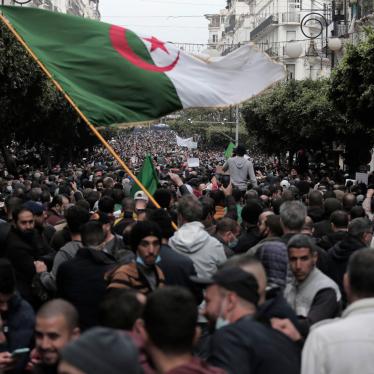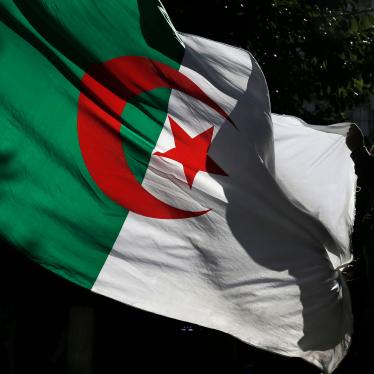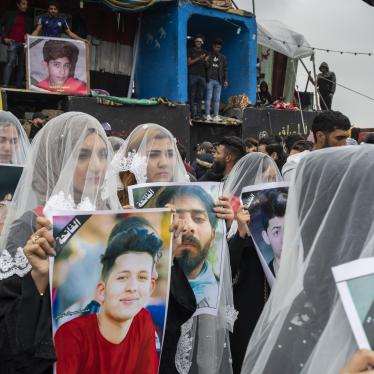(Tunis) – Algerian authorities should immediately release Slimane Bouhafs, an Algerian activist who disappeared a year ago from Tunisia and is now detained under investigation by an Algerian court, and ensure his freedom to leave the country, Amnesty International and Human Rights Watch said today.
Bouhafs had been living in Tunisia as a refugee and reappeared in Algerian police custody under unclear circumstances. Tunisian authorities should investigate his apparent abduction and forced return to Algeria, and hold anyone found responsible to account.
“Slimane Bouhafs fled Algeria after persecution by authorities, and the UN refugee agency in Tunisia granted him international protection in Tunisia,” said Amna Guellali, deputy Middle East and North Africa director at Amnesty International. “The last place Bouhafs should be is back in an Algerian prison, facing possible trial.”
On August 25, 2021, unidentified men in civilian clothes appeared at Bouhafs’ home in Tunis, forced him into a car, and drove away, the Bouhafs family said, citing information from witnesses. On September 1, 2021, Bouhafs appeared in an Algerian court, where a judge opened a criminal investigation against him for alleged links to the Movement for the Self-Determination of Kabylie, a group that Algeria considers a terrorist organization, and for Facebook posts, in a context of increased criminalization of peaceful activism. Algerian authorities had previously jailed him for two years for comments on Facebook deemed offensive to Islam.
Bouhafs, 55, is an Amazigh (Berber) activist and a Christian convert. In 2016, an Algerian court sentenced him to three years in prison under article 144 bis 2 of the penal code, which criminalizes publicly insulting the prophet Mohamed and denigrating Islam. Bouhafs’ family said that he suffered ill-treatment in prison. In 2018, he was freed by presidential pardon, moved to Tunisia, and applied for asylum with the United Nations refugee agency (UNHCR).
A support letter from an Algerian human rights group that Bouhafs’ family shared with Human Rights Watch and Amnesty International says that Bouhafs feared that Algerian courts might prosecute him again in retaliation for his activism. UNHCR granted him asylum in 2020 under an agreement between the UNCHR and Tunisian authorities.
Citing his accounts, Bouhafs’ family said that the men who abducted him put a bag over his head, took him by car over the Algerian border and to a police facility in Algiers, and threatened him during the ride.
For four days, Bouhafs’ family did not know his whereabouts. On August 29, they heard through informal contacts that Bouhafs was being held in a police station in Algiers.
On September 1, an investigative judge at the First Instance Court in Sidi M’Hamed, Algiers, remanded Bouhafs to prison pending investigation for 10 charges under Algeria’s penal code. They included “membership in a terrorist organization” (article 87 bis 3), “glorification of terrorism” (article 87 bis 4), “undermining the integrity of the national territory” (article 79), “offense against the Prophet [of Islam]” (article 144 bis 2), “publication of false news” (article 196 bis), “inciting hatred and racial discrimination” (article 295 bis), and “obtaining foreign funding” (article 95 bis), according to information from Bouhafs’ lawyers that his family shared with Human Rights Watch and Amnesty International.
On September 20, 2021, UN independent human rights experts asked the Tunisian and Algerian governments to explain any steps they had taken to transfer Bouhafs from Tunisia to Algeria, and any legal grounds for the criminal investigation against him in Algiers.
While Tunisian human rights activists say that President Kais Saied made a verbal promise on September 3, 2021, to investigate Bouhafs’ alleged abduction, Tunisian authorities have made no formal public comment on the matter.
Algeria responded to the UN experts in a letter dated October 7 claiming that Algerian security forces in Tebessa, Algeria, near the Tunisian border, had arrested Bouhafs on August 27 after he had tried to check into a hotel without showing identification. They transferred him to authorities in Algiers after discovering evidence linking him to the Mouvement pour l’autodétermination de la Kabylie (Movement for the Self-Determination of Kabylie or MAK), Algerian officials said in the letter.
Algeria has designated the group a terrorist organization since May 2021. In the same letter, Algerian authorities detailed accusations against Bouhafs under Algerian law. The authorities said they included messages attacking the Algerian state, its symbols, and its institutions, as well as messages praising the MAK and on his alleged communications with members of the group, and had communicated with members of the group.
However, Algerian authorities have said nothing publicly on how, when, and under what circumstances Bouhafs entered Algeria.
“A year has passed since Slimane Bouhafs disappeared from his country of refuge and reappeared in the custody of the country he had fled, without a word from either government as to whether he was brought there against his will,” said Balkees Jarrah, acting deputy Middle East and North Africa director at Human Rights Watch. “Tunisian authorities bore a responsibility under international law to protect Bouhafs, but there is no evidence that they have sought to investigate the matter and hold anyone found to have violated his human rights to account.”
Algerian authorities have refused requests to grant Bouhafs provisional release at least four times, according to his family and one of his lawyers.
Algerian authorities have increasingly used the Algerian penal code’s overbroad definition of terrorism, which President Abdelmadjid Tebboune expanded by decree in 2021, to prosecute activists and human rights defenders, Human Rights Watch and Amnesty International said. The authorities have also recently targeted other critics among the Algerian diaspora with travel bans and extradition.
Both Algeria and Tunisia have ratified the International Covenant on Civil and Political Rights (ICCPR). Article 19 guarantees the right to freedom of expression. Any restrictions on this right must be proportional and strictly necessary for a legitimate end.
As a party to the UN and African Refugee Conventions and the Convention Against Torture, Tunisia is bound by the principle of non-refoulement, prohibiting forced returns, expulsions, or extraditions – both of refugees to countries where they could face threats to their lives or freedom, and of anyone to countries where they could face torture. The 1951 Refugee Convention forbids expelling refugees who are lawfully in a contracting state’s territory except on grounds of national security or public order. Even in such cases, decisions should be reached in accordance with due process, unless “compelling reasons of national security otherwise require.”
Articles 6 and 9 of the ICCPR, guaranteeing the rights to life and to security, entail an obligation for governments to protect vulnerable people under their jurisdictions, including refugees. The governments should investigate any instances of forced disappearance and hold anyone found responsible to account, per official guidance on implementing the ICCPR by the UN Human Rights Committee. Article 12 of the ICCPR stipulates that everyone has the right to leave any country, including their own.








